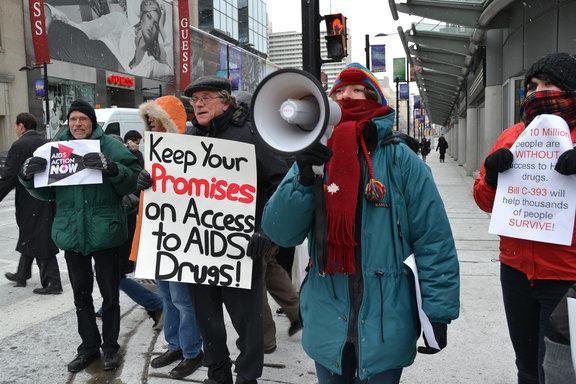The Dec 13 “die-in” flash protest in Toronto’s Dundas Square in support of Bill C-393 was designed to reach the ears of MPs in Ottawa. Did it work?
C-393 would amend Canada’s Access to Medicines Regime (CAMR), making it easier for generic drug companies to get cheap HIV and AIDS meds to the developing world. The bill was gutted in committee stage, and many of the protest signs were about restoring the “one-licence solution” that was cut out of the bill.
“I think that that’s really good,” says Liberal MP Glen Pearson of the flash protests.
Pearson, who has a great deal of experience working in Africa and in particular Sudan, recently learned of the flash mob phenomenon and hopes it can be put to good use.
“I know that young people care, and all power to them, because we are talking about life-and-death situations,” says NDP MP Olivia Chow, in whose riding the protest took place. “We know that those drugs could save lives, and save children from contracting AIDS if their mothers are able to take those drugs.”
Chow adds that she has participated in similar protests.
“The fact that Toronto is showing some solidarity and support means that this is a very meaningful bill that matters to a lot of people,” says Liberal MP Mario Silva. “I’ve always been very supportive of it, and I continue to be very supportive of it.”
Silva has been working with the Stephen Lewis Foundation in countries like Mozambique and points to the shortage of doctors and nurses, which hampers the distribution of those drugs.
The Liberal caucus remains divided in its support, however. Pearson has publicly suggested that C-393 will only raise false hope. Liberal industry critic Marc Garneau, who joined with Conservative MPs in committee to kill the one-licence solution clause, remains hostile to the bill.
“The Liberal Party very much shares the intent that’s behind C-393, which is to get medicines to countries in Africa to deal with serious diseases like HIV/AIDS, tuberculosis, malaria, and we have a policy in the Liberal Party that will address that in a realistic way that will get the medicines to Africa,” says Garneau. “C-393 is something that plays around the edges with intellectual property and will not achieve that aim.”
That policy is being developed by MPs like Pearson and Keith Martin, and it aims to have greater funds from CIDA to provide better access to needed drugs.
“Canadians want to provide medicines to countries that need them, and I agree with that 100 percent,” Garneau says of the flash protest. “How do we do that? There’s different thinking with respect to how we do it.”
Pearson also has concerns about the ultimate message of the protest, adding that a generic “Pass 393” message “gets people to not consider how important that yay/nay thing is,” with reference to the upcoming vote on ensuring the bill can be transferred to NDP MP Brian Masse (its original author, Judy Wasylycia-Leis, resigned her seat in an unsuccessful bid to become Winnipeg’s mayor).
“That’s the important thing, and we’ve got to fight to see it get at least to the next stage under Brian Masse,” Pearson says.


 Why you can trust Xtra
Why you can trust Xtra


